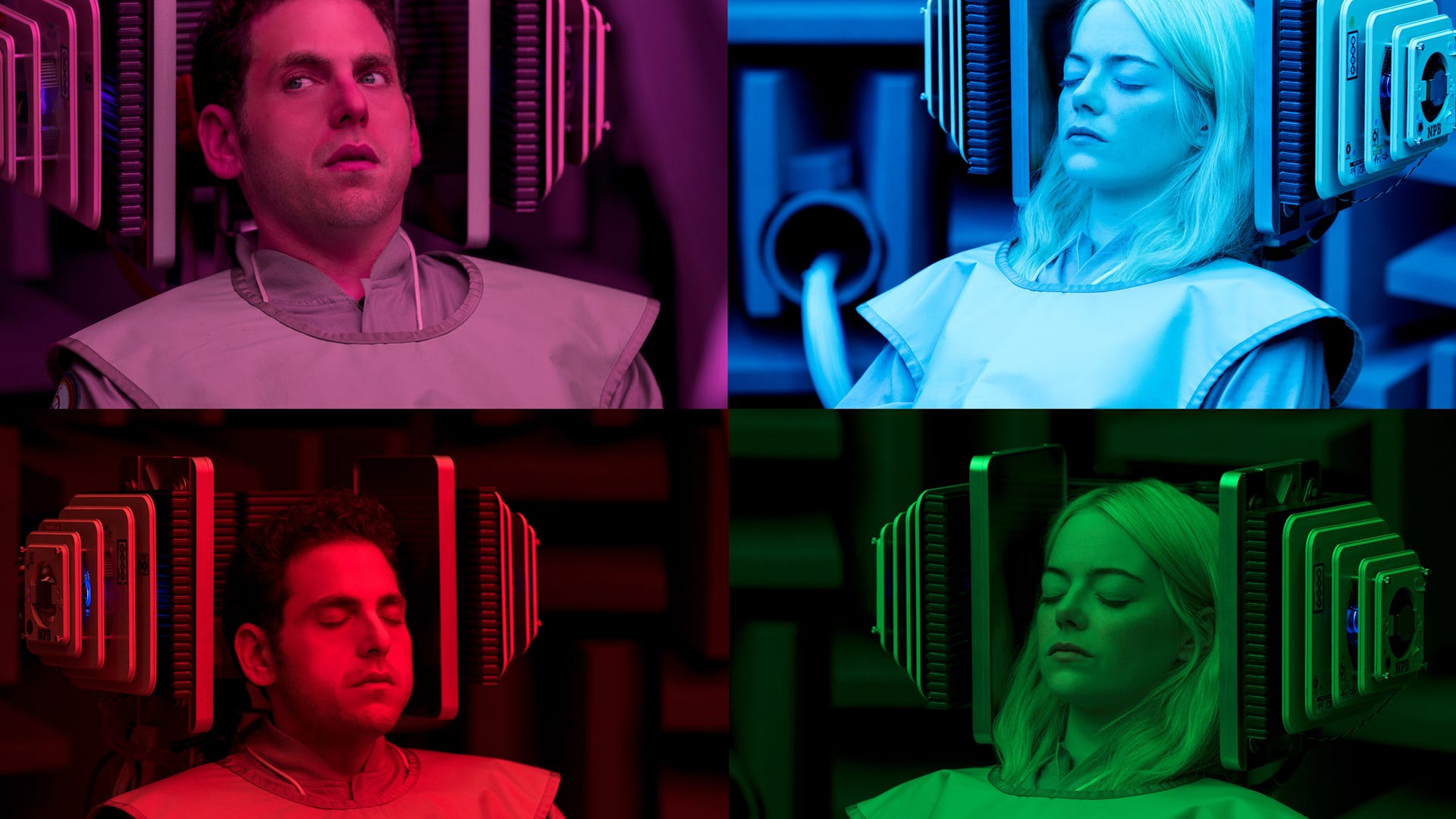Join or Sign In
Sign in to customize your TV listings
By joining TV Guide, you agree to our Terms of Use and acknowledge the data practices in our Privacy Policy.
Maniac Review: Addictive Netflix Series May Cause Confusion, Elation, Total Awe
Cary Fukunaga's exploration of the mind exceeds its delusions of grandeur
You can try to prepare yourself for what's in store with Netflix's new series Maniac, but stop... just stop. In this review of I'll repeatedly tell you how Maniac is weird as hell, and as a journey into how messed up the subconscious is that's also drenched with questions about social norms, mental illness, and existential crises, it damn well better be. But don't let the weird tag scare you off, though; Maniac is the boldest, most unique, and flippin' strange masterpiece of 2018.
I'll try to explain what the premise of the show is without giving away too much, but it's kind of like trying to tell someone what air tastes like. Maniac is set in -- as far as I can tell -- an alternate future Japanese-influenced Earth with technology that is both far ahead of what we know and way behind where we are. That is, however, a highly irrelevant detail, even though it's all you'll think about in early episodes. Annie (Emma Stone) is a downtrodden woman with an addiction and haunted past while Owen (Jonah Hill) is a probable schizophrenic with a crappy family, and their situations lead them both to participate in a highly risky pharmaceutical trial, because it pays a whole lot more than the safe ones. Even that's something that doesn't get to what Maniac is really about, because Maniac is thematically so strong that these specifics become fun distractions instead of crucial details..
From there, Maniac plays out like a chameleon in a multi-colored strobe light, changing its look and even shape -- the rule-breaking series' 10 episodes range from 25 to 45 minutes, and ping-pong between absurdist comedy, science fiction, and drama -- as the drug trial attempts to map its subjects' minds to fix them and offer a permanent alternative to therapy. That means deep, vibrant dives into the psyches of the participants through dream-like sequences (called "reflections" in the show), some of which last entire episodes.

Jonah Hill, Emma Stone; Maniac
Michele K. Short / Netflix
This immersion into these boundless journeys is where Maniac's true form lies and where viewers will figure out what Maniac really is about. Healing. Letting go. Connection. Everything on the surface of Maniac is just a means to cover these themes in beautiful ways as it explores them in cosmic and existential fashion. Yes, I realize I sound like I'm full of shit, but Maniac is -- cliché inbound but this time I really mean it -- unlike anything else on television.
This gives Hill and Stone the opportunity to put on many different hats (wigs, actually) as they jump from reality to reality, most of which are clearly influenced by popular movie genres. Things obviously don't go as planned, and their reflections intertwine to the surprise of themselves and the crackpot scientists leading the trial. Annie and Owen's minds don't always allow them to decipher what is real and what is not, meaning extended portions of Maniac just sort of happen without explanation but are entertaining on their own and hold hints about what's going on.
But here's where Maniac is able to pull this off, whereas something like FX's Legion was not (full disclaimer, I only saw about half of Season 1 of Legion before jumping ship). I'll probably have a lot of people disagree with me after they watch it, but Maniac never plays with our sense of reality and isn't trying to trick us. We clearly know what is real and what is not even when the reality of the characters' lives are blurring with their reflections. The whole show has a lot of similarities to dream interpretation, and like that pop psychology, it has some clear answers to the troubles Owen and Annie face and other things that can't be explained because they're byproducts of the messed-up supercomputer we have in our skulls. Most importantly, almost everything in these reflections is still anchored to the main tenets of the show rather than just being there for a trippy ride, man. The answers aren't always easy, but they are there even if it takes a while to find them. (I assume a rewatch will unlock a whole new layer to things.)
The Best New Shows on Netflix This Week
Few could take this complicated formula and not have it totally fall apart, but director Cary Fukunaga (Season 1 of True Detective) is at the top of his A-plus game here. In the reality of Maniac, he's settled in on an aesthetic that's what we thought the future would look like 50 years ago (the thickness of the computer monitors is downright uncomfortable), and in the reflections he adapts to whatever reality he needs to portray in new inventive ways (an ode to mob movies is particularly fun). There's even a one-shot sequence that recalls his legendary True Detective scene, albeit on a smaller scale. Visually, Maniac is worth a watch on its own.
But the playfulness of the writing, mostly from novelist Patrick Somerville, is the real find. On-the-nose metaphors hide in plain sight in the series' reality (one character sequesters himself in a 1970s-looking space-capsule pod called an A-Void while in the throes of depression, presumably because it was more fun than showing him sad in a dark room) while the emotion of the situation is very real. In reflections, things get even weirder, as characters set out to accomplish weird goals (lemurs are a big part of one for reasons unknown). But it's the characters' process of completing the goal, rather than the goal itself, that's important to the story, which allows Somerville to go full bonkers with what Annie and Owen's alter egos do. And when you think about it, is it any different than a superhero trying to find a glowing cube to beat the supervillain when the real purpose of it isn't the cube, but to prove that the hero was within? McGuffins are everywhere and intentionally odd to prove that very point, and they're brilliantly used within the dream-like framework as nothing is held back.

Rome Kanda, Sonoya Mizuno; Maniac
Michele K. Short / Netflix
The on-screen work is just as good. I'd bet thousands of dollars that by next summer, two good-looking actors will wake up early in the morning to read off the names of Emma Stone, Sally Field and Justin Theroux (and Fukunaga, obviously) when next year's Emmy nominations are announced. Stone is particularly fantastic in moments with her sister (played by current It Girl Julia Garner), and Field and Theroux share some of the series' best scenes, with Field surprisingly game for what Somerville throws at her and Theroux's all-in performance soon to be the object of GIF makers everywhere. Even Hill -- whose story isn't as good as Stone's -- shines in certain moments, especially those in which he's playing opposite sides of the spectrum, like when he's weighed down as part of a violent crime family or when he's a goofy caricature of an Icelandic ambassador.
The side characters also add to the oddities, in wonderfully weird Maniac fashion. Take the drug trial's leader, Dr. Muramoto (Rome Kanda), for example. The brainiac running things turns out to be one of the goofiest figures in the show, and his backstory turns the show on its head in the final act as his ghost hangs over the trial. But it's his reemergence in a reflection in a bit that recalls Young Frankenstein that's truly amazing. The mysterious depth of these tag-alongs should be explored more in, I don't know, message boards and fan fiction. Maniac does enough to give everyone just enough depth to stoke curiosity but leaves it up to us to fill in the blanks. And I haven't even started on the artificial intelligence that plays a pivotal role in everything.
Everything in Maniac adds up to what will inevitably be a friendship test. Some viewers will be in awe of Maniac's spectacle and its ability to wrap something so simple in such elaborate dress, while others will dismiss it as ravings of a lunatic with a multi-million dollar budget. If you open your heart and mind -- maybe find some drugs of your own for that -- I think you'll find Maniac is the perfect prescription for shaking up what you think television could be.
Maniac premieres Friday, Sept. 21 on Netflix.
